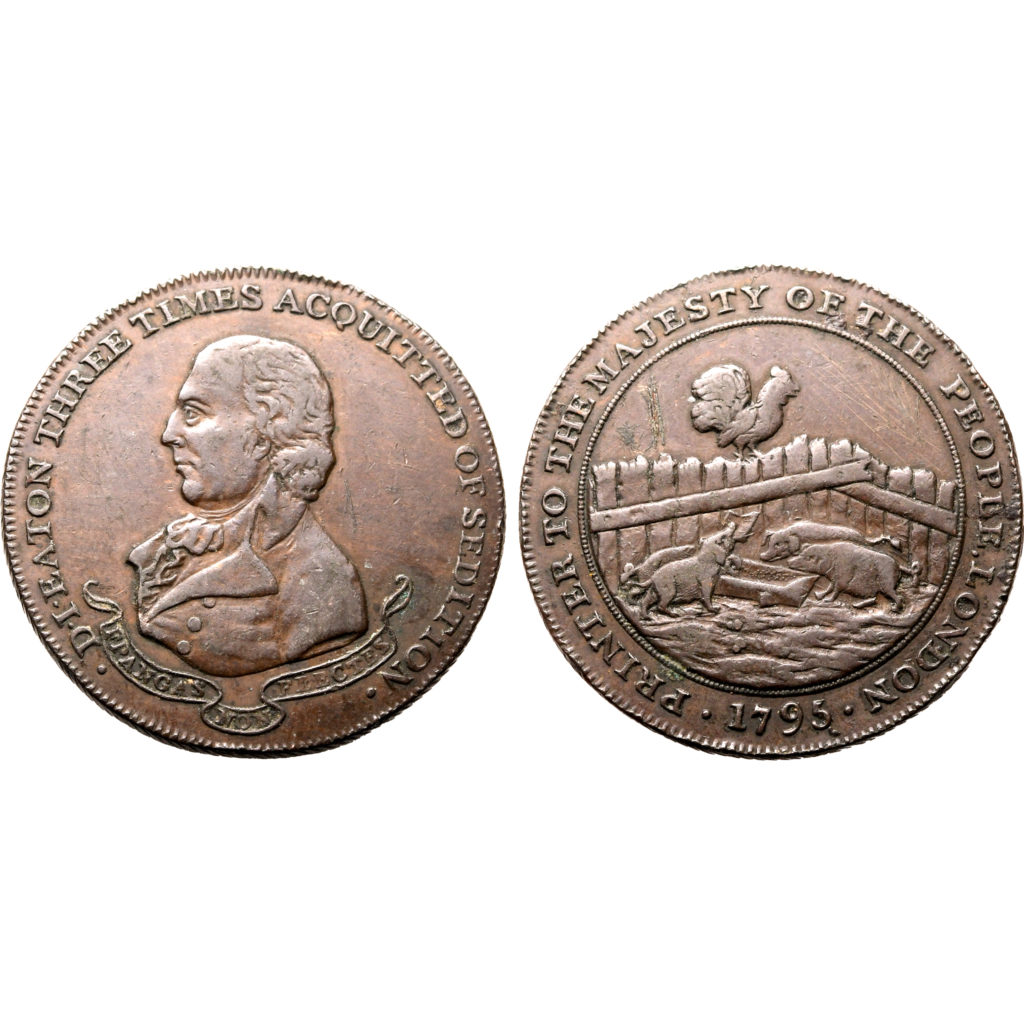Who Was Daniel Issac Eaton?
Who was Daniel Issac Eaton? Good question. Until lot 209 was consigned to us, I would’ve asked the same question. Little known to history, Eaton was a writer and publisher, infamous during his time for his involvement with radical thought and doctrine. The late 18th century saw an international explosion of radical thinkers: the Age of Enlightenment was in full swing and Daniel Issac Eaton was an enlightened man.
Daniel Issac Eaton’s Involvement in Radical Literature
Radicalism was taking Great Britain by storm in the 1790s. Partly inspired by the philosophies of the Age of Enlightenment, Radicalism was not welcomed by many members of the establishment as its core principles aligned with anti-monarchist sentiments, with many ‘radicals’ campaigning for electoral reforms.
Eaton often worked alongside these radical thinkers, publishing their works in his periodical Politics for the People. One such example was the publication of a speech that John Thelwall gave in 1793. In his statement, Thelwall joked about a tyrannical king whom he called ‘King Chanticleer’ who was beheaded by his subjects. After reprinting this speech, Eaton was arrested. This was one arrest out of many that took place between 1793 and 94 which later became known as the 1794 Treason Trials. Orchestrated by William Pitt, these trials were an attempt to quell the radical movement.
The indictment against Eaton referred to him as ‘malicious, seditious, and evil-disposed‘. A man who attempted ‘unlawfully, maliciously, and sediously contriving, devising, and intending to scandalize, traduce, and vilify our said Lord King‘. The prosecutor claimed that King Chanticleer was a mockery of King George III, and to discuss beheading him would be treasonous. In an attempt to bankrupt him, Eaton was imprisoned for three months during the course of the trial.
He was, however, acquitted, thanks to his defence – John Gurney. Gurney argued that rather than being an indictment of monarchy, the statement was in fact an indictment of tyranny. He continued that if the King Chanticleer was meant as a representation of any king it would be King Louis XVI, and if anyone was guilty of portraying George III in such a manner – it was the prosecution.
Thomas Paine’s The Age of Reason
You would think that Eaton’s involvement with John Thelwall and the Treason Trials of 1794 might’ve discouraged him from pursuing his radical beliefs. But this was not the case. Just a few years later he published The Age of Reason by Thomas Paine, the American Founding Father.
Thomas Paine was a pivotal figure in the Age of Enlightenment, making his name as a revolutionary pamphleteer and political philosopher during the late 18th century. His influential works passionately advocated individual rights and the removal of monarchies. Moreover, he championed the school of thought ‘deism’. To him, this meant a belief in God the Creator, but a dismissal of all religious texts, religious mysteries, as well as reports of miracles. Enlightenment Deism asked its followers to approach religion with reason, to take the natural world as proof of God rather than resting on the words of a book or another man.
Paine’s writings played a crucial role in garnering public sentiment during the American Revolution, inspiring people to seek independence from British rule. His ideas echoed Enlightenment principles of reason, secularism, and the inherent rights of individuals. The Age of Reason was a bestseller in the States, however, Paine remained a controversial figure abroad. In the UK, his work was not as positively received. Instead of becoming a best-seller, the book sparked anger amongst the British. The French Revolution was fresh in everyone’s minds, as such, they feared political radicalism and were hostile towards rhetoric that might incite this.
The Trial of Daniel Issac Eaton
Daniel Eaton published parts one and two of The Age of Reason in 1796, selling them for one shilling and sixpence, this would be around £7 in 2021. This price meant it was more affordable to the lower classes who may not have been afforded an education at this time. Radical ideas were becoming accessible. The Age of Reason promoted ideas of equality, freedom, and liberation. All of which resonated with the lower classes, and stoked an anti-establishment sentiment in the hearts of many.
In 1812, Eaton was tried eight times and sentenced. During his trial, he was accused of being an atheist. Eaton challenged this, instead claiming deistic beliefs. The romantic poet, Percey Shelley, wrote to the judge the 4,000-word pamphlet A Letter to Lord Ellenborough in Eaton’s defence. In it, he argued for the concept of freedom of the press. Shelley claimed that he had waited for months for someone to come to Eaton’s defence, to point out, what he considered to be, the suppression of individual expression. But, when no one did, he decided to attack the sentence himself.
Despite the lack of evidence to point to Eaton’s atheism and his support from Shelley, the jury pronounced him guilty. His sentence was particularly extreme; 18 months in Newgate Prison with monthly pillorying for his entire imprisonment.
Unfortunately, this is where the story of Daniel Issac Eaton seems to drift off. As a man who has been largely forgotten by history, huge portions of his life are lost to us. However, this does not go to say that what we do have is any less interesting. The information we do have paints a picture of a man who stood by his beliefs and defended the right to individual thought.
Daniel Eaton at Auction
Monies, Medals & Militaria | Thursday 29th February 2024
Viewing times (ID required):
- London
- 20 February 2024 10.00-16.00
- 21 February 2024 10.00-16.00
- Birmingham
- 28 February 2024 10:00-16:00
Virtual viewings are available by request. Virtual viewings are the ultimate personal shopping experience. Using Zoom, you can ask us whatever you need to know in order to buy with confidence. Find out more here.
Valuations
Our valuations are free, with no obligation to sell with us. Our experts will value your item with an estimate, so you can find out what it could achieve at auction.
The process is simple. You can fill in a form online or book an appointment to visit either of our offices in Birmingham or London. Virtual valuation appointments are also available.
Find what you’re looking for
Make sure you don’t miss finding that special something by signing up to our email alerts. You’ll be the first to know when catalogues become available, receive invitations to special events and preview the hottest lots from our auctions, plus much more.
Why not use our free personal shopping service? Sign up for lot alerts and tell us exactly what you are looking for. Each time we upload a catalogue, we search for your keywords and email you lots matching your interests. Your personalised email will include images, lot descriptions and auction details.
Cordelia Porter | Research Coordinator



